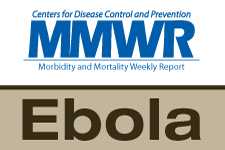Questions and Answers about Ebola, Pets, and Other Animals
How are animals involved in Ebola outbreaks?
Because the natural reservoir host of Ebola has not yet been confirmed, the way in which the virus first appears in a human at the start of an outbreak is unknown. However, scientists believe the first patient becomes infected through contact with an infected animal, such as a fruit bat or primate (apes and monkeys). This is called a spillover event. Person-to-person transmission follows and can lead to large numbers of affected persons. In some previous Ebola outbreaks, primates also were affected by Ebola and multiple spillover events occurred when people touched or ate infected primates.
How does Ebola spread?
When infection occurs in humans, the virus can be spread in several ways to others. Ebola is spread through direct contact (through broken skin or mucous membranes in, for example, the eyes, nose, or mouth) with
- blood or body fluids (including but not limited to urine, saliva, sweat, feces, vomit, breast milk, and semen) of a person who is sick with or has died from Ebola,
- objects (like needles and syringes) that have been contaminated with body fluids from a person who is sick with Ebola or the body of a person who has died from Ebola,
- infected animals, such as fruit bats and primates (apes and monkeys), and
- possibly from contact with semen from a man who has recovered from Ebola (for example, by having oral, vaginal, or anal sex).
Ebola is not spread through the air or by water, or in general, by food. Mosquitos or other insects cannot transmit Ebola virus. However, in Africa, Ebola may be spread as a result of handling bushmeat (wild animals hunted for food) and contact with infected bats.
Only a few species of mammals (for example, humans, monkeys, and apes) have shown the ability to become infected with and spread Ebola virus. There is no evidence that mosquitoes or other insects can transmit Ebola virus.
What types of pets are most likely to get infected or sick with Ebola?
Certain exotic or unusual pets (such as monkeys, apes, or pigs) have a higher risk of being infected with and shedding Ebola virus if they are exposed to the virus.
Can dogs get infected or sick with Ebola?
At this time, there have been no reports of dogs or cats becoming sick with Ebola or of being able to spread Ebola to people or other animals. Even in areas in Africa where Ebola is present, there have been no reports of dogs and cats becoming sick with Ebola. There is limited evidence that dogs become infected with Ebola virus, but there is no evidence they develop disease.
Are dogs and cats in the United States at risk of becoming sick with Ebola?
The risk of an Ebola outbreak affecting multiple people in the United States is very low. Therefore, the risk to pets also is very low, as they would have to come into contact with blood and body fluids of a person with Ebola. Even in areas in Africa where Ebola is present, there have been no reports of dogs and cats becoming sick with Ebola.
Can a person get Ebola from their dog or cat?
At this time, there have been no reports of dogs or cats becoming sick with Ebola or of being able to spread Ebola to people or animals. The chances of a dog or cat being exposed to Ebola virus in the United States is very low as they would have to come into contact with blood and body fluids of a symptomatic person sick with Ebola.
Can a pet’s body, fur, or paws spread Ebola to a person?
We do not yet know if a pet’s body, paws, or fur can pick up and spread Ebola to people or other animals. It is important to keep people and animals away from blood or body fluids of a person with symptoms of Ebola infection.
What if there is a pet in the home of an Ebola patient?
CDC recommends that public health officials in collaboration with a veterinarian evaluate the pet’s risk of exposure to the virus (close contact or exposure to blood or body fluids of an Ebola patient). Based on this evaluation as well as the specific situation, local and state human and animal health officials will determine how the pet should be handled.
Can I get my dog or cat tested for Ebola?
There would not be any reason to test a dog or cat for Ebola if there was no exposure to a person infected with Ebola. Currently, routine testing for Ebola is not available for pets.
Can pigs become sick with Ebola?
Pigs are the only species of livestock that are currently known to be susceptible to any Ebola virus. Pigs are not known to be naturally infected with the Ebola species in the ongoing outbreak in West Africa. However, in laboratory experiments, when given extremely high doses of Ebola virus (species Zaire ebolavirus), some pigs have become sick. Transmission from Ebola virus-infected pigs to monkeys was also demonstrated in the laboratory setting. The chances are very low of a pig being exposed to Ebola virus in the United States, as a pig would likely have to come into contact with blood and body fluids of a symptomatic person sick with Ebola. Modern swine production practices include strict farm biosecurity and monitoring of workers, making this scenario extremely unlikely.
Pigs have been found to be naturally infected with Reston virus in the Philippines and China. Reston virus is a species of Ebola that does not cause human illness. The pigs in the Philippines and China were infected with Reston virus and other viruses including porcine reproductive and respiratory syndrome virus (PRRSV), so it was not clear if Reston virus was responsible for any clinical signs in these pigs. No clinical signs were observed in pigs experimentally infected with Reston virus.
Can pigs spread Ebola?
Pigs are not known to become naturally infected with Ebola virus (Zaire ebolavirus), and therefore there is no indication that they are involved in virus transmission. However, there is indication that Reston virus can be passed from pigs to humans, though neither pigs nor people are affected by the disease. Pigs, including pet pigs, such as potbellied pigs, should not be allowed to have contact with anyone who is sick with Ebola. Healthy pigs already living in the United States and with no exposure to a person infected with Ebola are not at risk for being infected or spreading Ebola.
Can monkeys spread Ebola?
Yes, monkeys are at risk for Ebola. Symptoms of Ebola infection in monkeys include fever, decreased appetite, and sudden death. Monkeys should not be allowed to have contact with anyone who may have Ebola. Healthy monkeys already living in the United States and without exposure to a person infected with Ebola are not at risk for spreading Ebola.
Can bats spread Ebola?
Fruit bats in Africa are considered to be a natural reservoir for Ebola. Bats in North America are not known to carry Ebola and so CDC considers the risk of an Ebola outbreak from bats occurring in the United States to be very low. However, bats are known to carry rabies and other diseases in the United States. To reduce the risk of disease transmission, never attempt to touch a bat, living or dead.
Can non-mammals (birds, reptiles, amphibians, or fish) become sick with Ebola?
There is currently no evidence that Ebola virus can infect non-mammals kept as pets including birds, reptiles, amphibians, or fish. No Ebola virus has been detected in non-mammal species collected in previous outbreaks of Ebola in Africa.
What are the requirements for bringing pets or other animals into the United States?
CDC regulations require that dogs and cats imported into the United States be healthy. Dogs must be vaccinated against rabies before arrival into the United States. Monkeys and African rodents are not allowed to be imported as pets under any circumstances.
USDA has import regulations that are intended to protect the livestock population of the United States. These regulations address certain livestock diseases that do not occur in the United States, such as foot-and-mouth disease and classical swine fever, among others. USDA regulations prohibit the entry of live ruminants (including cattle, sheep and goats) and pigs from most countries in Africa because of the presence of these diseases. Additional information on USDA and Animal and Animal Product Import is available.
Each state and U.S. Territory has its own rules for pet ownership and importation, and these rules may be different from federal regulations. Airlines may have additional requirements.
- Page last reviewed: February 18, 2016
- Page last updated: February 18, 2016
- Content source:




 ShareCompartir
ShareCompartir